[DECODED] Pro-Duterte Facebook page pits independent newsrooms vs 'grassroots' media
Read more
Without proper accountability, OPTIC Politics can operate and post with impunity, leading people astray
MANILA, Philippines — A Pro-Duterte Facebook page is framing an investigation by the Philippine Center for Investigative Journalism (PCIJ) on Duterte influence operations as elitist, while branding articles written to support the Dutertes as grassroots reporting and analysis.
PCIJ’s investigation on August 7 explained how influencers, human supporters, AI deepfakes, and robotic amplifiers alter perception of the Dutertes by turning the public against legitimate news organizations, propping up reports supporting the Dutertes, or attacking reports representing them negatively.
For example, Duterte supporters, who previously criticized the Supreme Court with attacks and fake news for not acting against ex-president Rodrigo Duterte’s arrest by the International Criminal Court, suddenly praised the High Court as “fair and just” after the en banc declared Vice President Sara Duterte’s impeachment unconstitutional.
OPTIC Politics calls PCIJ’s report ‘partisan’
One partisan page, OPTIC Politics, made two posts after the PCIJ report was published. On August 9, it called PCIJ’s writing a “smear” against OPTIC Politics and pages of its type, and said PCIJ's journalism "selectively attacks pro-Duterte accounts like OPTIC Politics, while ignoring distortions coming from opposition outlets."
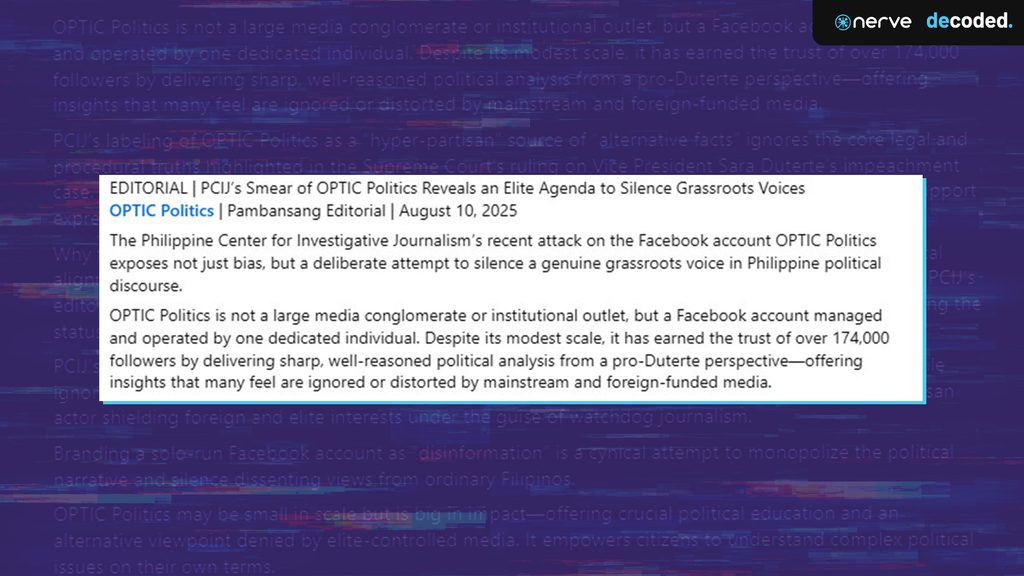
This, despite attempts by PCIJ to mark similar disinformation campaigns by Marcos-aligned influencers.
Speaking with Rappler, Regine Cabato, one of the authors of the PCIJ investigation, called the posts “part of a tired Duterte-era script" leveled against news media.
“All these organizations retain editorial independence and oversight; they are registered, pay their taxes; their employees and contributors have bylines and credentials you can search; and if mistakes are made, corrections are issued. While the industry is not perfect, it has ethical rules and best practices for accountability that these anonymous pages do not,” she said.
The framed narrative, she said, builds on a lie and veers toward conspiracy.
Its second post on August 10 tried to explain why PCIJ apparently “targeted” the Dutertes, conflating the appointment of journalist Carmela Fonbuena (who previously worked with Rappler) as PCIJ’s executive editor as an attempt to coordinate anti-Duterte media strategy.
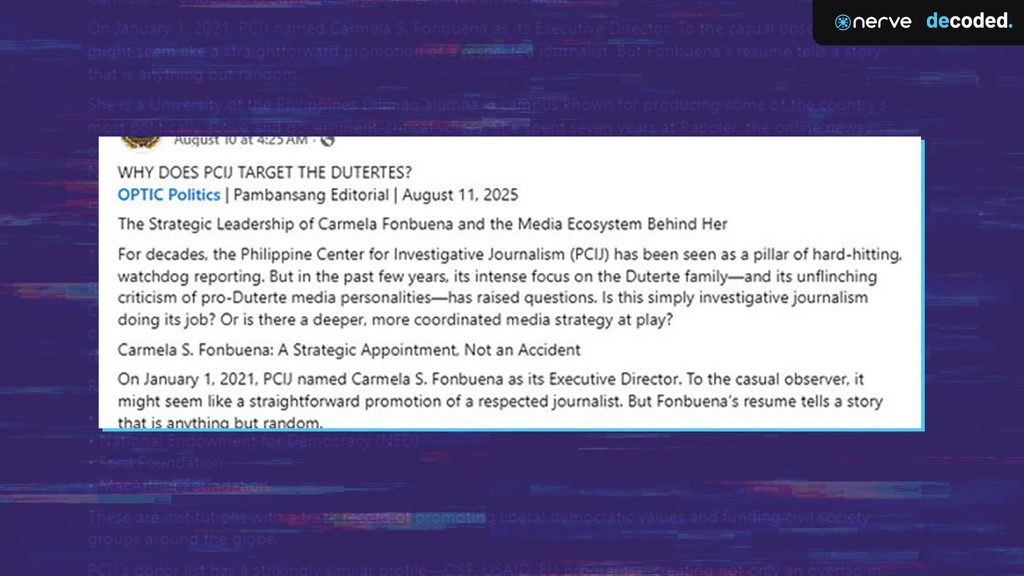
OPTIC Politics said PCIJ and Rappler’s foreign sources of funding were a point of contention and should elicit suspicion because they have what it called "a track record of promoting liberal democratic values and funding civil society groups around the globe."
OPTIC Politics wrote that mainstream outlets do not just criticize Duterte, but are also dismissive of him and his policies and achievements, while vilifying his brand of governance. It counterpoints the “polished halls of investigative journalism” with “the noisy, messy energy of grassroots digital voices,” which it positions itself as.
Cabato countered, “Our piece was researched, went through an editorial process, and was not commissioned for some partisan purpose — which cannot be said of their content. Do they think they’re the only ones who can be independent?”
Hiding behind anonymity
OPTIC Politics claims to provide “in-depth editorial analysis & commentaries on political dynamics,” but is fairly new, having been set up in March 2024. It is managed by a Canada-based account-holder, according to The Nerve's earlier reporting.
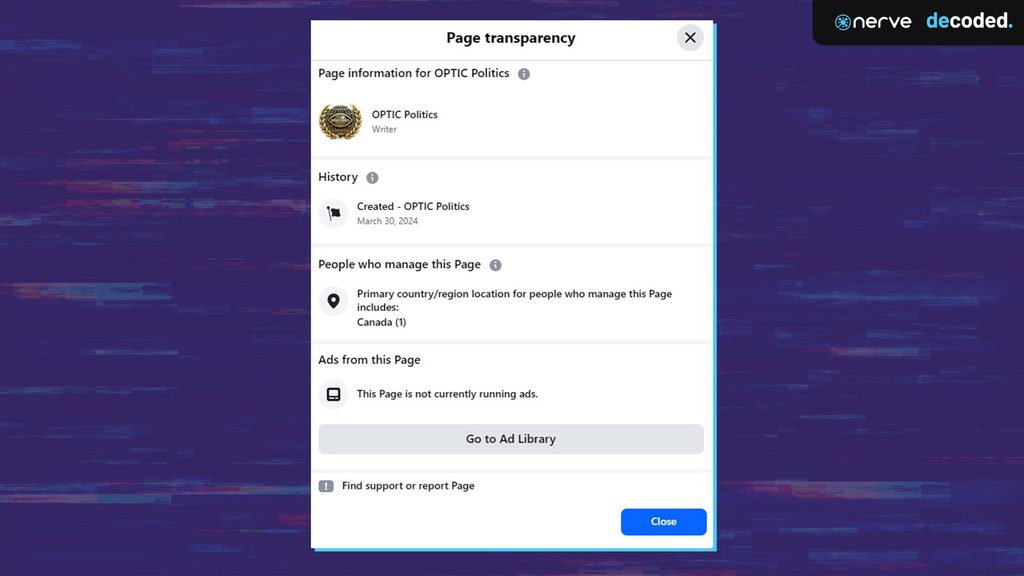
OPTIC Politics' author is unnamed, which appears standard for Facebook pages. The author can only be contacted through an email address.
Without proper accountability, OPTIC Politics can operate and post with impunity about topics — and people — it supports.
Its earliest posts on March 30, 2024 allege that President Ferdinand Marcos Jr. has a self-serving agenda, with China-US tensions presenting an opportunity for him to make deals, offering Philippine land "for the development of US military bases in exchange for the release of their offshore assets.” That post ends with pro-Duterte hashtags: #PDPLaban; #IndaySaraDuterte; #NoToChaCha; and #MarcosResign.
OPTIC Politics also has a subscriber group where users can pay a monthly fee to support it. The subscription page shows an apparent deepfake of Marcos inhaling a substance, but with Marcos facing the opposite direction when compared to a post debunking the deepfake in May.
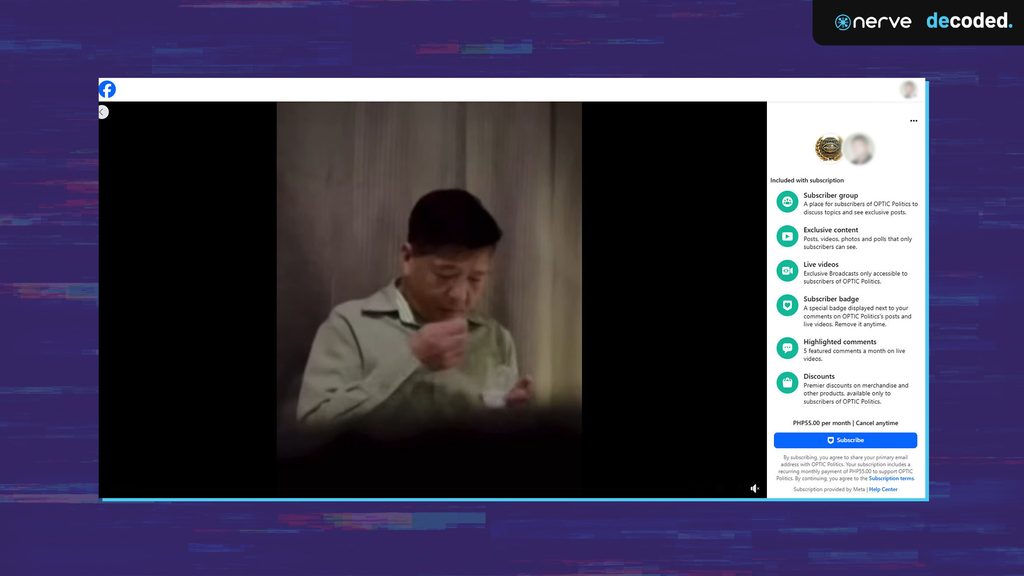
Its posts criticizing PCIJ are written to avoid posting falsehoods, and had its own disclaimer saying it was an interpretation based on publicly-available information, credible reporting, and logical analysis.
By insinuating media reports are coordinated "to discredit the Duterte brand, weaken its influence, and reclaim the narrative space from independent, grassroots media,” it leads commenters to believe the worst of news media operating under established standards of journalism. OPTIC Politics pushes the idea that newsgroups aren’t out to record the facts and scrutinize public figures. The statements also have a common refrain: attacking journalists for doing their work.
Real people can be led astray when they see Facebook and Instagram algorithms propping up OPTIC Politics’ posts or when these posts are amplified by bots.
What comments say on a post — alongside how often they are said — can shape people's beliefs on a given issue.
Commenters call PCIJ 'corrupt' or 'biased'
There were 64 comments and 170 shares on OPTIC Politics' August 10 post, “Why does PCIJ target the Dutertes?” as of September 4. The comments skewed towards calling PCIJ corrupt or biased, leftist, communist, CIA-funded, or part of the deep state.
Such statements contain outright disinformation, given that PCIJ is a non-stock, not-for-profit independent media group that received an endowment from the Ford Foundation back in 2003.
One commenter even posted an essay tying PCIJ to the Communist Party of the Philippines and insinuating it had a hidden agenda: destabilizing the Philippines.
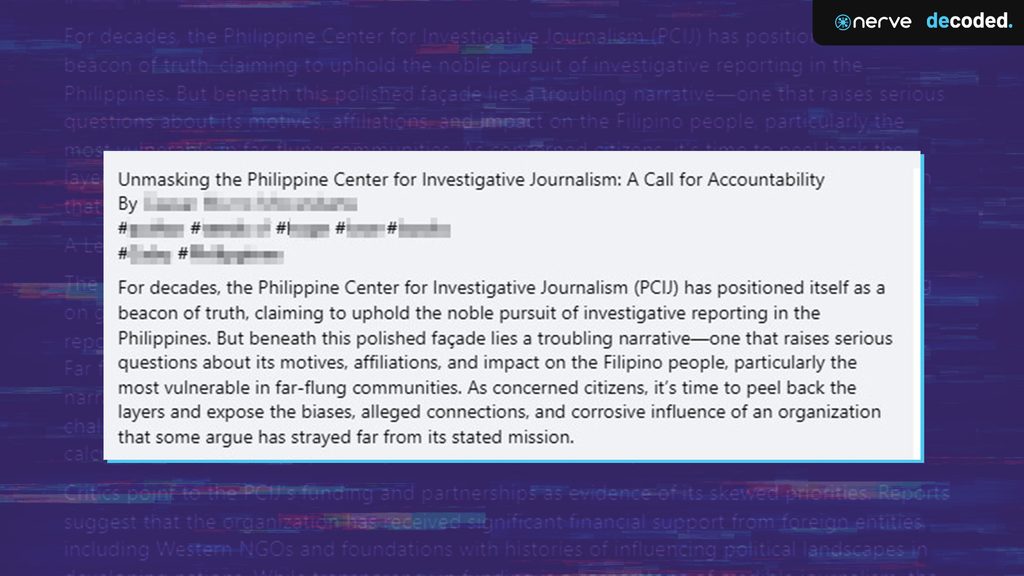
The practice of red-tagging a journalist or media organization is also straight out of the populist playbook and puts people at risk of psychological or physical harm.
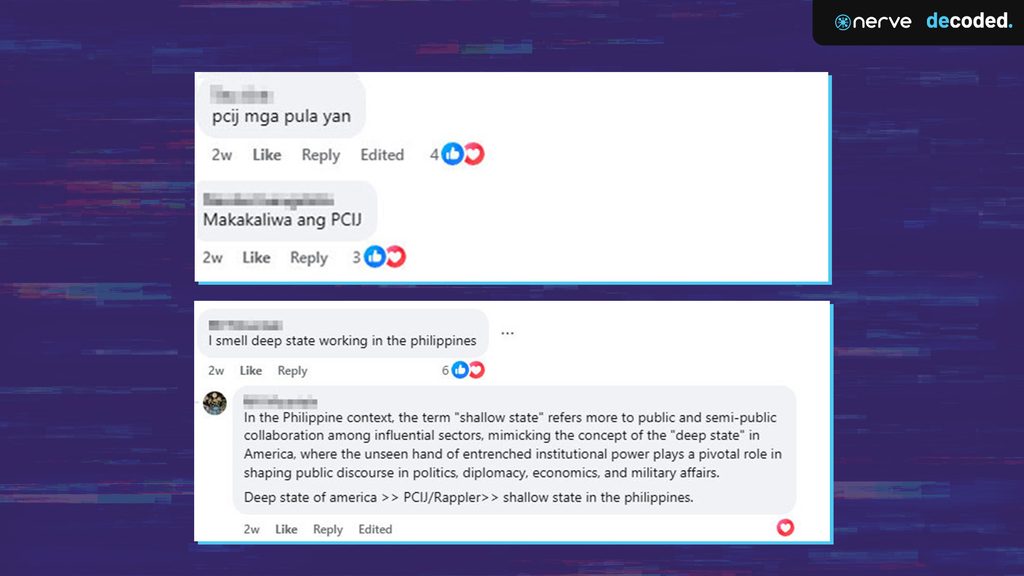
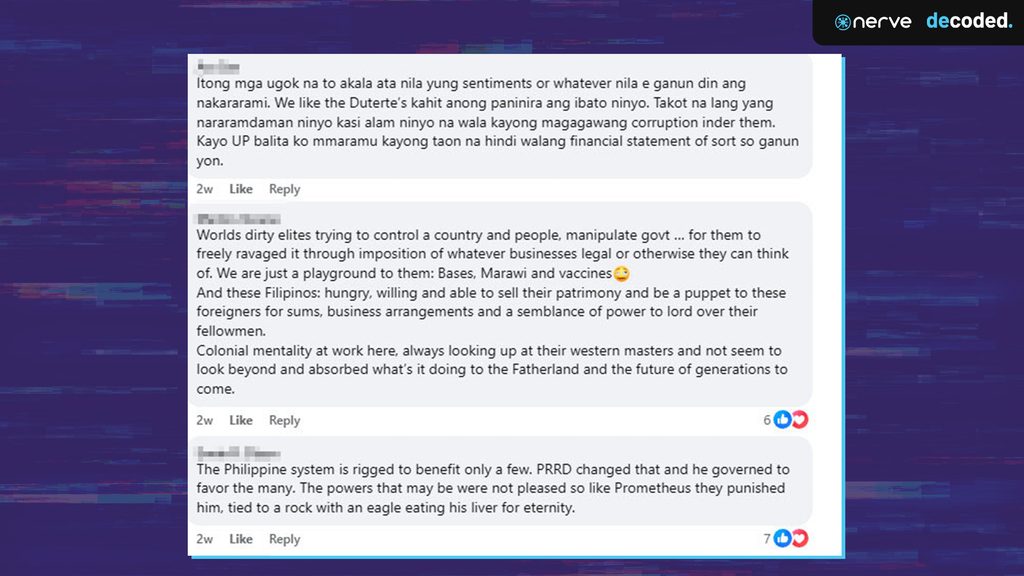
Praising OPTIC Politics, bashing news media
As of September 4, OPTIC Politics’ August 9 post — “PCIJ’s smear of OPTIC Politics reveals an elite agenda to silence grassroots voices” — has garnered 178 comments and 416 shares. As this was a repost, the number of comments and shares is likely higher.
The comments mostly support the post, with commenters praising OPTIC Politics for providing fair analysis. Other posts combined support for the page with criticism of PCIJ and other news media.
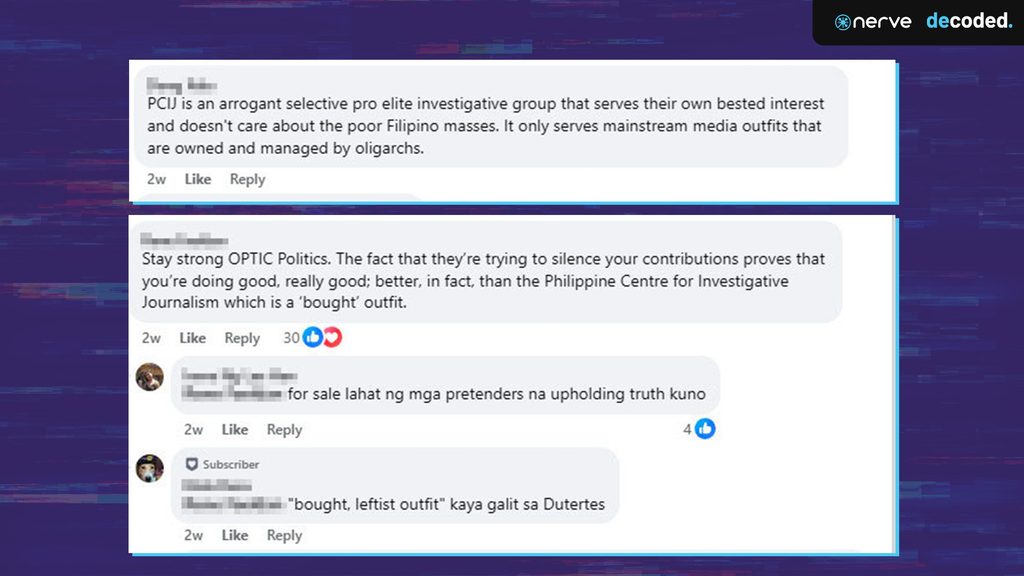
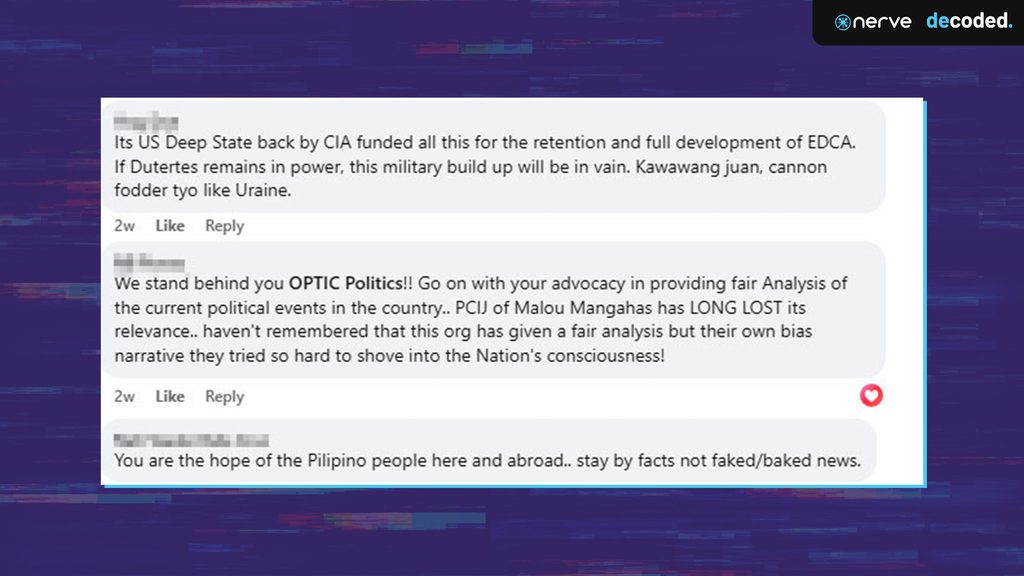
'Without editorial gatekeepers’
Cabato said “the pro-Duterte disinformation network postures as a victim to a fictional cabal of conspirators they call ‘elites.’"
"It’s designed to sow distrust in institutions, and orient their followers toward personality worship,” she added.
Partisan influencers are “equally — actually, more — capable of and vulnerable to the corruption and foreign interference they accuse journalists of... because their platforms and anonymity, by design, are not transparent," she said.
Speaking about OPTIC Politics in particular, Cabato said the page unwittingly admitted to working "without editorial gatekeepers," and with content that "resonates emotionally."
"These pages bank on emotion because they cannot stand on facts. They do not want editorial oversight, because they do not want to be accountable for what they post. But these pages never hold their political idols accountable, so how can they be expected to be accountable themselves?” she added.
Why does this matter?
This is a glance at a side of partisan political speech, one which Filipinos should care about.
As Don Kevin Hapal, data and innovation director at The Nerve, said about why people should care about the UK’s Southport riots, “Filipinos should care because the mechanics are the same, no matter where they play out. Narratives are planted long before they erupt, designed to manipulate emotions and fracture societies. Platforms profit when outrage spreads faster than facts, and the tactics cross borders effortlessly.”
As Cabato explained, “They gaslight the free press, and the public, into thinking they are victims when they have been harassing journalists and media outlets in coordinated campaigns for years. And that harassment — whether it’s by trolls or real people — is on full display in comment sections and our spam folders.” – Rappler.com
This story was originally published on Rappler on September 4, 2025.
Decoded is a Rappler series that tackles Big Tech not just as a system of abstract infrastructure or policy levers, but as something that directly shapes human experiences. It is produced by The Nerve, a data forensics company that enables changemakers to navigate real-world trends and issues through narrative and network investigations. Taking the best of human and machine, we enable partners to unlock powerful insights that shape informed decisions. Composed of a team of data scientists, strategists, award-winning storytellers, and designers, the company is on a mission to deliver data with real-world impact.






